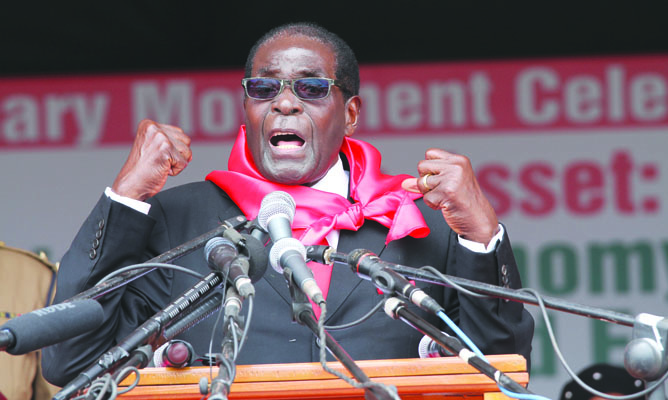
President Robert Mugabe’s stint as Southern African Development Community (Sadc) chairperson ends next week and there would be nothing tangible to show for it because he was a polarising figure.
Mugabe is also serving as the rotating chairperson of the African Union (AU) and his term would be up soon.
Last week, he was quoted claiming that African leaders refused to recognise his leadership on regional bodies because of interference by Britain and France.
Mugabe reportedly told the Zanu PF central committee last Friday that his plane was blocked from entering Ivory Coast by President Alassane Ouattara.
Ivory Coast is a former French colony and the Zimbabwean leader believes Ouattara’s decision followed prodding by France. He told the Zanu PF meeting that the French say: “Mugabe is a dangerous man and don’t work with him.”
Mugabe said Britain was also trying to exert pressure on African leaders to shun him.
Mugabe is fond of seeing shadows whenever he fails and the rant against African leaders was predictable, but his leadership of the two institutions was bound to be a dumb squib because he is part of yesterday’s men.

- Chamisa under fire over US$120K donation
- Mavhunga puts DeMbare into Chibuku quarterfinals
- Pension funds bet on Cabora Bassa oilfields
- Councils defy govt fire tender directive
Keep Reading
His Sadc stint got off to the worst possible start after he clashed with South African President Jacob Zuma and former Namibian President Hifikepunye Pohamba who refused to sign the Protocol on Trade in Services at the summit held in Victoria Falls last year.
Mugabe railed against Zuma saying he should co-operate with other countries instead of seeking to turn the region into a market for South Africa’s products.
The protocol provided for a mandate to progressively negotiate removal of barriers to the free movement of services in the region.
South Africa and Namibia requested for more time to scrutinise the protocol when other Sadc countries signed it in 2012.
Mugabe’s public rebuke of Zuma set the tone for a turbulent reign as Sadc chairperson.
He also had a topsy-turvy relationship with his Sadc deputy, President Ian Khama of Botswana who skipped some of the regional meetings. Khama would take over from Mugabe during the Sadc summit that opens in Gaborone next Monday and expectations are that he would steer the regional body towards making up for the lost ground.
The region is still burdened with challenges such as rising poverty, unemployment, HIV and Aids, unemployment and an alarming electricity deficit.
These issues received scant attention during Mugabe’s term as he majored on his obsession with Western countries. He sought to use his positions at Sadc and AU to fight these imaginary wars instead of focusing on bread and butter issues, hence the snub by other African leaders.
Mugabe also exerted too much of his energy towards influencing African opinion against the International Criminal Court at the expense of critical issues confronting the continent today.
Africa has a new breed of leaders, preoccupied with transforming their countries and have no time for vindictive politics of the past.
Mugabe continues to go against the grain on the human rights front and has an unfashionable history when it comes to the conduct of elections.
He is not the kind of leader who will endear himself to the new crop of leaders emerging in today’s Africa and it should not be a surprise that he was not embraced by his peers.
Mugabe was rejected by leaders on the continent because his ideas represented the past, not that the British and the French were at war against him.











